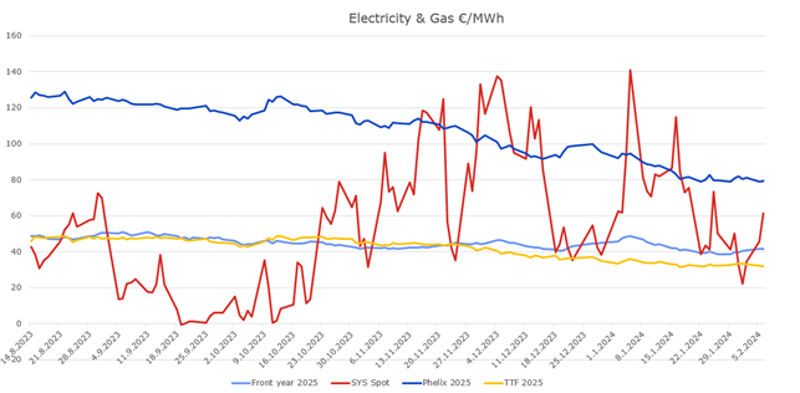Flexibility is the key to success in volatile energy markets
Uneasy geopolitical situation poses many threats that are reflected in Nordic electricity markets. Read more about current trends and the reasons behind the current price levels, and why flexibility reigns supreme when navigating energy markets.
Amidst a backdrop of geopolitical turmoil, our world stands at a crossroads. Russia’s brutal war in Ukraine has passed its second anniversary with no clear resolution in sight. Elsewhere, war rages in the Middle East, North Korea maneuvers towards strategic alliances with Russia, while China endeavors to resolve the Taiwan issue. Moreover, the political divide preceding the upcoming US presidential elections looms large, potentially impacting foreign policy decisions around the globe.
Furthermore, in financial spheres, the US stock market thrives, propelled by a select few dominant companies dubbed "the magnificent seven." Despite indicators like the PMI and strong labor market not reflecting any loss in economic momentum, the inflation seems persistent, and it is uncertain how it will enable the Federal Reserve to reduce interest rates in the coming months.
In Europe, narrowly dodging recession in the fourth quarter, inflation edges closer to the ECB's 2% target, prompting anticipation of rate cuts by summer. More urgently than its US counterpart, the European Central Bank must consider the need for support for the economic sentiment while navigating climate commitments and reducing reliance on Chinese supply chains.
Rapidly changing supply-demand situation will impact investments’ profitability
The geopolitical uncertainties and the massive movements such as climate change prevention ripple through various sectors, including energy markets, where volatility is becoming the norm. In the Nordic region, derivate prices of electricity closely correlate with hydro balance, which reflects the availability of water for hydroelectric power. Changes on the forecasts on the balance will impact the future price expectations, which for the consumer are visible on the price fluctuations on fixed price contracts. In the Nordics there has been increase on electricity usage this winter, partly because colder winter but also for other reasons, and there has been a downturn in surplus of electricity in the Nordics.
However, despite the geopolitical turmoil, the European natural gas market has remained stable this winter, with ample inventories and consistent LNG supplies despite minor logistical hurdles. Germany, as Europe's largest gas consumer, has experienced rather mild temperatures, leading to a dip in gas prices and subsequently, electricity prices, below the marginal costs of gas-fired production.

Traditionally, investments' profitability relied on steady baseload consumption of electricity, but this might change. Solar power floods the market in summer, while windy days in autumn and spring, with less heating demand, could lower prices.
Long-term perspective on hedging strategies offers stability
As geopolitical tensions and economic uncertainties persist, the importance of flexibility in energy market strategies becomes increasingly evident. Demand flexibility and energy storage are becoming popular, and technologies like flexible demand, electric boilers, pump-storage plants, and batteries present promising solutions.
While electricity derivative prices have been declining since mid-2022, hedging remains a crucial strategy in managing market risks. A long-term approach to hedging strategies can still yield benefits, mitigating volatility and providing stability. However, on top of this challenges persist on the physical electricity side, price fluctuations hourly and in very near future 15-minute intervals and balance risks with increasing difficulty on forecasting, highlighting the importance of 24/7 control on top of effective portfolio management.
In this evolving landscape, flexibility reigns supreme, offering rewards for those who are adept at navigating the complexities of the energy markets. Indifference, however, bears a price tag. As experts of these markets, we remain committed to maximizing opportunities and minimizing risks, ensuring optimal outcomes for our valued customers.
Eerik Ekström works as market analyst on Gasum subsidiary, Gasum Portfolio Services Oy, offering independent portfolio management and market analysis services on electricity, natural gas, and emission allowance customers.



